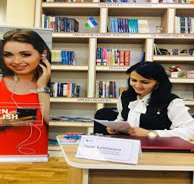
English in Higher Education for 22 years.
Currently, I am a Senior Lecturer of “Tashkent Institute of Irrigation and
Agricultural Mechanization Engineer” National Research University.
Simultaneously I work as an English teacher at Specialized School on Exact
Sciences under the mentioned university. I am also actively participating in various British Council projects, e.g. the Online Teacher Community Team, Change Academy, etc. I also decided to take part in this training to improve my teaching practices.
My NETRUZ Classroom-based Research Project was aimed at identifying proper vocabulary teaching strategies for ESP students majoring in Agricultural Mechanization (students especially with less developed ESP vocabulary). I have been motivating my learners to overcome various vocabulary learning difficulties, which hinder their proper communication with each other. My students believe that learning English for Specific Purposes will lead them to acquire speciality-related foreign languages and make them become competitive graduators, which is a demand of the labour market at present. With this in mind, they work hard on themselves and as a supporter, I also assist them to overcome the language barrier by accelerating their speaking skills in English. Thanks to the NETRUZ project I am improving my teaching skills as well as my students’ vocabulary learning skills in my lessons.
In my research project, I explored the reasons why my students (students of agricultural mechanization) use less ESP vocabulary, sometimes even L1 in English classes and the ways to switch them on English in laboratories, where I conducted my classes with the aim to increase the motivation of my students. I started to pay more attention to the way that learners use English with me in the class, even before the audience in the laboratory classes, where different tractor equipment was demonstrated for new guests with the participation of students. It was interesting for me to understand my learners' perceptions and expectations. Additionally, identifying my colleague's opinions about my classes through critical-friend observations was huge assistance for me, as we could find the solutions to the existing problems, that we faced in our classes. I learnt about other ELT teachers' experiences related to my context from different articles and webinars provided by NETRUZ Project.
Reflection on training and exploratory action research:
Overall, within the training course, I was able to develop the methodologies that work in my teaching context and learnt how the learning outcomes might be better when as teachers we feel our readiness to change our approaches in teaching with a big hope for better understanding.
No comments:
Post a Comment